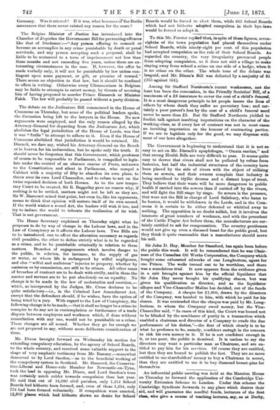The Home Secretary explained on Thursday night what he proposes
to do by way of change in the Labour laws, and in the Law of Conspiracy as it affects the Labour laws. Two Bills are to be introduced, one to effect the alteration necessary as regards civil penalties, the other to define strictly what is to be regarded as a crime, and to be punishable criminally in relation to these matters. Breaches of engagements which involve danger to the public, in relation, for instance, to the supply of gas or water, or where life is endangered by wilful negligence, and also "wilful and malicious" injuries to property, whether by omission or by commission, are still to be crimes. All other cases of breaches of contract are to be dealt with civilly, and in these the master and servant are to be put absolutely on an equality. No change is to be made in the law of molestation and coercion,— which, as interpreted by the Judges, Mr. Cross declares to be quite satisfactory—i.e., in the Criminal Law Amendment Act, except that the defendant should, if he wishes, have the option of being tried by a jury. With regard to the Law of Conspiracy, the following change is to be made,—that it shall no longer be a crime to conspire to do any act in contemplation or furtherance of a trade dispute between employers and workmen which, if done without consultation with any one, would not be punishable as a crime. These changes are all sound. Whether they go far enough we are not prepared to say, without more deliberate consideration of them.


































 Previous page
Previous page